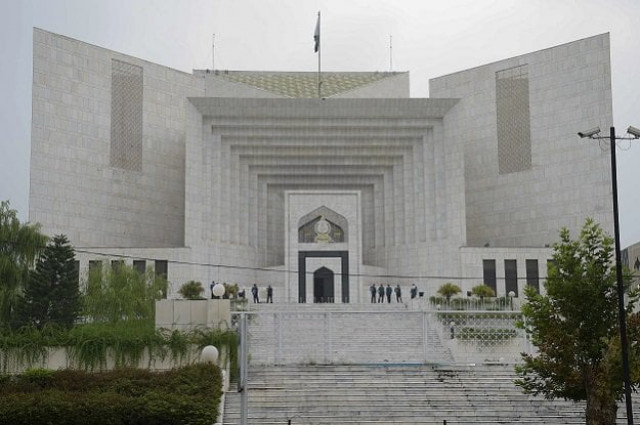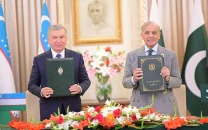SC wants CCI decision on Kalabagh dam honoured
Issues detailed verdict over construction of dams

Supreme Court of Pakistan. PHOTO: AFP
“The court beckons all Pakistani citizens to honour public interest and the common good, and to strive harder to work towards forging unanimity with respect to the construction of Kalabagh dam,” says a four-member bench in its detailed verdict on the public interest matter regarding construction of dams, especially Kalabagh dam.
The bench is headed by Chief Justice of Pakistan Mian Saqib Nisar and comprises Justice Umar Ata Bandial, Justice Ijazul Ahsan and Justice Munib Akhtar.
“The four brothers must bury their perceived differences and put their heads together earnestly and sincerely to ensure water security for the prosperity of Pakistan and our future generations. Let it not be said that we failed them,” adds the court verdict.
The last hearing was conducted on July 4. Out of four, three judges belonged to Punjab.
The bench, however, expressed dismay that the executive did not take steps for the construction of Kalabagh dam in view of the Council of Common Interests’ (CCI) September16, 1991 and May 9, 1998 decisions.
The CCI in its first decision approved the construction of the multipurpose project. Likewise, the council in its second decision on May 9, 1998 revisited the project when the Natural Water Resources Development Program (NWRDP) headed by the Ministry of Water and Power was directed to prepare for its detractors a document explaining the issues involved in the construction of Kalabagh dam and addressing political and technical concerns about it.
It was also directed that supplementary projects in support of the dam be prepared to mitigate its effect.
The Supreme Court also decided to form a committee for utlisation of dams fund. The committee shall have authority to invest in some profit bearing scheme. Two Supreme Court judges will be appointed to monitor the utlisation of fund.
"We are inclined to establish a Fund Disbursement Committee in order to ensure that the amounts deposited in the fund are utilised solely for the purposes of the project, and are not misused, misapplied or misappropriated.”
The court said that all the provinces should honour the agreement, adding that considerable headway over political concerns about the Kalabagh dam project was made in the 1990s by the CCI, the highest executive forum under the Constitution, for recording concurrence of the federating units of matters involving their common interest.
“Nevertheless, imperceptible vested interests have managed to block progress in implementation,” says the court order.
“We observe with great dismay that no progress has been made in this regard. Unfortunately, we have been apprised by various stakeholders – including Mr Shams-ul-Mulk, ex-chairman, WAPDA, and an eminent expert and scholar in the field of water resources and power, that at present all the provinces still entertain apprehensions on this front.
“We must iterate that dams, particularly those that are large in size and magnitude, are national projects to be carried out for the collective benefit of the whole nation and not for the advantage of one specific group of persons at the cost of another,” says the verdict authored by chief justice.
The court in its 24-page ruling says that despite the fact that Kalabagh dam could significantly redress water and electricity needs of the country, “there has been great resistance against its construction in the past”.
“However, there is evidence to suggest that many of the fears and misgivings held by various people are misconceived and not well-founded, being based on certain preconceived premises and presumptions. Particularly, we find that many of the concerns raised would not in themselves be remedied by resisting the construction of Kalabagh Dam, but through strict adherence to the terms agreed upon by all the provinces in the Water Apportionment Accord, 1991 in letter and spirit, i.e. to distribute water to the provinces in accordance with their respective shares provided therein,” states the order.
The court said it never realised and was surely overwhelmed by the huge public response in the form of generous donations for this national cause and the nation’s confidence reposed in and respect extended to the Supreme Court of Pakistan.
“The trust placed by the public became manifest as their contributions were made with the clear expectation that the Supreme Court shall control disbursements of funds to ensure that these are applied judiciously and economically towards the project,” says the order.



















COMMENTS
Comments are moderated and generally will be posted if they are on-topic and not abusive.
For more information, please see our Comments FAQ